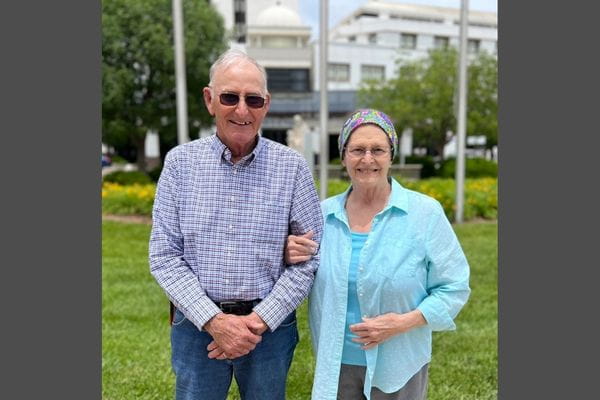Ultimately, she was scheduled for surgery to address the issue in June 2015, which was then put on hold when her preoperative lab work showed some concerning blood levels. Carra was referred to medical oncologist Quoc Truong, who after performing a bone marrow biopsy delivered some unsettling news: She had multiple myeloma, a type of blood cancer that she had never even heard of, much less dreamed that she might be affected by.
"I am still the only one in my town of 1,000 that I know of ever to be diagnosed with myeloma," says the 74-year-old resident of Kiowa, Kansas, where she is well-known for her homemade chocolate business. "It's been an education for me and my friends."
Today, she is continuing to recover, having successfully undergone chimeric antigen T-cell therapy at the Cancer Institute at Ascension Via Christi St. Francis after exhausting all other avenues of treatment.
"I think it probably saved my life," she says, giving her more time with her husband, Mike, and their three grown children and eight grandchildren and two great grandchildren, and hope that she might live into her nineties like her six aunts before her.
A journey of ups and downs
After being diagnosed with multiple myeloma, Carra underwent a stem cell transplant of her own healthy cells at the Cancer Institute at St. Francis. That resulted in a 10-month remission of her disease, during which time she underwent a femur revision surgery.
But then her cancer returned and she began a series of oral chemotherapy drugs, none of which her body tolerated for any length of time. One caused problems with her hearing, leading her to require hearing aids, another affected her eyesight, leading her to require cataract surgery.
"My eye doctor said no more of that drug," says Carra, who was switched to another medication, which after two doses, caused her hemoglobin, white blood cell and blood platelet counts to fall to dangerously low levels.
Last year, her hip pain also returned, eventually leading her to see ortho oncologist Christopher Halphen, with Ascension Medical Group Via Christi. Imaging and a biopsy found that a mass the size of a cantaloupe had grown over her iliac. She underwent radiation, but it only slightly reduced the tumor.
Dr. Truong asked her if she was interested in receiving CAR T-cell therapy, for which patients with multiple myeloma must have first exhausted four or more other lines of therapy to meet the criteria.
If so, he would put her on the list to receive Abecma, which uses a patient's own genetically modified white blood cells to recognize and attack multiple myeloma cells that express a specific antigen.
"Of course we said yes," says Carra, and on Dec. 2, 2021, her white blood cells were harvested by the local chapter of the American Red Cross and sent to a lab in New Jersey to be turned into a living drug that finds and kills cancer cells throughout the body.
A day to remember
On Jan. 17, Carra received an infusion of her own re-engineered cells at the Cancer Institute at St. Francis, one of only two certified cellular therapy treatment centers in Kansas.
"I will remember that date forever," she says.
Eight days later, she was discharged from the hospital. She remained in Wichita for the next six weeks, making daily visits to Cancer Center of Kansas' lab and to the Ascension Via Christi Infusion Center at St. Francis for blood and platelet transfusions as needed. One of their sons, daughter and granddaughter took turns keeping Carra company. The Via Christi Foundation paid for the first week of her hotel stay and the manufacturer of her cell-based gene therapy covered the rest and even provided a food card.
Carra was briefly readmitted to the hospital twice, the first time for flu-like symptoms and the second time after she became dizzy and fell. But she continued to steadily improve and on March 6 was released to return home. Since that time, the tumorous mass on her iliac has shrunk and shows signs of dying.
At first, she made trips to the Cancer Center of Kansas' Pratt office three to four times a week.
"That has slowly dwindled down to once a week to check my labs," she says, noting that while her platelets remain low, she hasn't needed blood or platelets for about a month. She also makes quarterly visits to Wichita for PET scans and office visits with Dr. Truong. Her June PET scan and labs were good, showing she is making a phenomenal recovery.
Carra still tires easily, uses a walker for balance and continues to have mild back and joint aches, along with a tingling sensation in her fingers, lower legs and feet.
However, she is slowly rebuilding her strength and energy levels. She continues to be grateful for the compassionate and personalized care she received from the entire cellular therapy team. And she remains optimistic about the future of cancer care.
"I told my kids: In your generation there will be one shot to cure cancer because so many advancements are being discovered and there are so many doctors, nurses, scientists and others in the medical field who care."
As for her own future, she's eager to return to making and selling chocolate truffles at craft shows.
"I think I will try it again this Christmas," she says.
Learn more about Cancer Care at Ascension Via Christi

